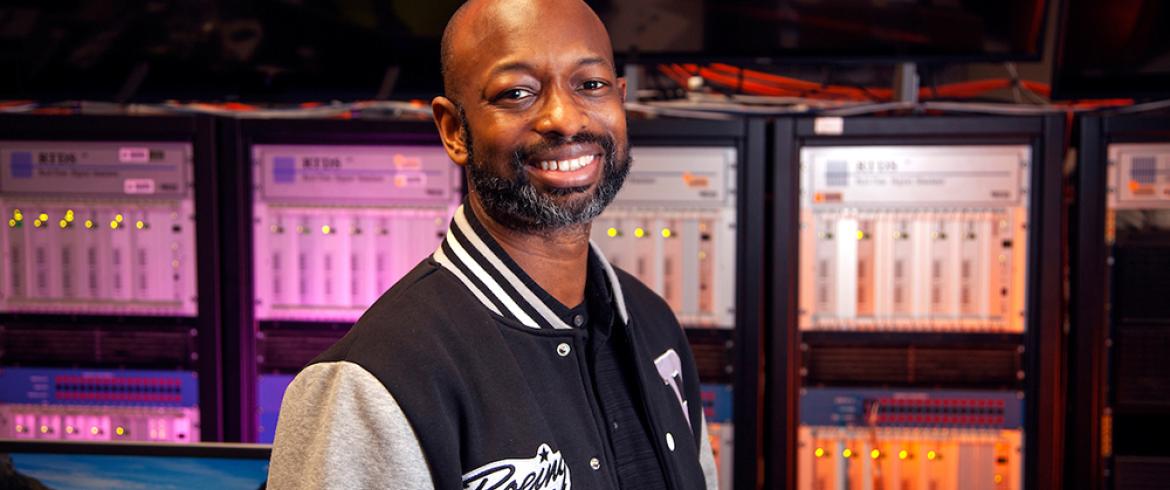
When Nathan Brooks, Ph.D., was a young student in the FAMU-FSU College of Engineering, he walked in two worlds. He and his wife were pursuing engineering degrees while also juggling with life as a young married couple with a newborn.
“My professors were really understanding and flexible with me. There were a lot of late nights, my wife and I couldn’t afford child care so, we would schedule our classes so one of us could be with our son,” said Brooks, who lives in Fairfax, Virginia, with his wife, Angela, and have four children. “I always made good grades even though it was hard. My professors were really understanding. That support is something I will never forget. They truly took an interest in me and I really appreciate them for that.”
Brooks returned to campus as part of a program put on by his employer, aerospace giant Boeing, and the University Scholarship Program. The series of activities included classroom visits, information sessions at the FAMU-FSU College of Engineering, and presentations.
Brooks graduated in 2004 from the FAMU-FSU College of Engineering and was the first to earn his doctorate in electrical engineering from FAMU. The first National Science Foundation Graduate Fellow to study at FAMU, Brooks later earned an NSF Post-Doc fellowship and completed his post-doctoral studies at the CERN, the European Organization for Nuclear Research.
After college, he started his career at Argon where he had the chance to work on many exciting projects for Defense Advanced Research Projects Agency (DARPA).
Brooks works as an electromagnetic specialist Argon, which Boeing acquired in 2013. He helped developed instrumentation that the military and defense use to listen and locate people who are using radios or other communication devices that is currently transitioned to the military and is being used or being prepared for use. Brooks is a technical fellow working for Boeing’s Defense and Space Division and develops Antennae systems.
“Being able to use simple devices to find someone is straight out of a Batman movie. In a recent movie, Batman use’s everyone’s cell phone to locate the Joker, the idea is to locate people using normal devices,” said Brooks. “We already have devices to do that but what is unique is to use normal radios that soldiers would have to do the same thing.”
Last year, he received the National Society of Black Engineer’s lifetime achievement award largely in part for his work with DARPA. Some of his work includes helping war fighters know what’s going on when they go into a building. He worked with projects involving locating people and being able to see through walls.
Dedra O’Neal, director of the FAMU Scholars Program, remembers contacting Brooks in 1994 when he was a National Merit Scholar in Houston. At that time, he had been admitted to the Air Force Academy, the Massachusetts Institute of Technology and other prestigious schools.
“I needed to close the deal, because he was like no other candidate for the Life Gets Better Scholarship, that year,” O’Neal said. FAMU collaborated with Occidental Chemical Corporation to provide an opportunity no other university was offering - an internship straight out of high school for Brooks.
“He is a trailblazer, and earned many firsts while studying at FAMU,” O’Neal said. “Many of the challenges our youth experience today in high school he encountered, but he used them as motivation to exceed the odds.”
Brooks credits his time at FAMU.
“I have learned to appreciate the relationship that FAMU and FSU have at the College of Engineering,” he said. “The experience helped me become more multi-dimensional and well-rounded. Being able to work with research institutes because of the affiliation with FSU and being able to receive the support and guidance of FAMU provided a great platform to get to where I am now.”
Brooks had some advice for students interviewing with Boeing or any engineering company.
“When it comes to internships you need to be prepared; know what type of interview you are having. Behavioral ones are very specific; you need to be able to tell your story and elaborate on what you have done rather than list all your credentials,” Brooks said. “Don’t get caught flat- footed; do your homework about the company; know the position you are applying for and steer your experiences toward that.”
FAMU President Dr. Larry Robinson mentioned Brooks in a February, 2020 op-ed that ran statewide as an example of why the state and FAMU should continue to support the joint college of engineering.
